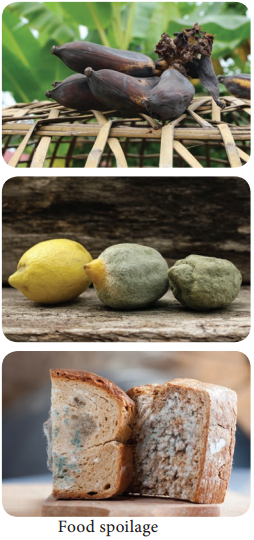Learninsta presents the core concepts of Microbiology with high-quality research papers and topical review articles.
Food Spoilage and its Causes
Spoilage of food can be defined as any visible or invisible change which can make food or product derived from food unfit for human consumption. Spoilage of food not only causes health hazard to the consumer but also causes great economic losses. Spoilage leads to loss of nutrients from food and cause change in
original flavor and texture.
It is estimated that about 25% of total food produced is spoilt due to microbial activities despite a range of preservation methods available. Food spoilage is considered as a complex phenomenon where by a combination of microbial and bio-chemical activities take place. Due to such activities various types
of metabolites are formed which aid in spoilage (Figure 5.1).
i. Perishable foods
These foods are readily spoiled; require special preservation and storage condition for use. This includes, foods such as dairy products, eggs, poultry, meat, fish, fruits and vegetable. These foods get spoiled easily by natural enzymes.
ii. Semi – perishable foods
This class of foods if properly stored can be used for a longer duration. These foods include processed cereals, pulses and their products like flour, semolina, parched rice and popcorn. Shelf life of these products depends on the storage temperature and moisture in the air.
Foods like potato, onion, nuts, frozen foods and certain canned foods can be stored for a week to a couple of months at room temperature without any undesirable changes in the products.
iii. Non – perishable foods
These foods remain stable for long period unless handled improperly. Nonperishable foods include sugar, jaggery, hydrogenated fat, vegetable oil, ghee, whole grains, dhals, whole nuts and processed foods like dry salted fish/meat, papads, canned foods, jams and murabbas. These foods do not spoil unless they are
handled carelessly.
Causes of Food Spoilage
Food and water may be infected by germs. Fly carries germs to food. There are various factors which are responsible for food spoilage such as.
- Microorganism
- Insects
- Rough handling
- Transport
- improper storage
- enzyme activity (Chemical reaction)
- unhygienic conditions
- physical changes, such as those caused by freezing, burning, drying pressure.
Signs of food spoilage include difference in appearance from the fresh food such as a change in colour, a change in texture and an unpleasant odour or taste.
